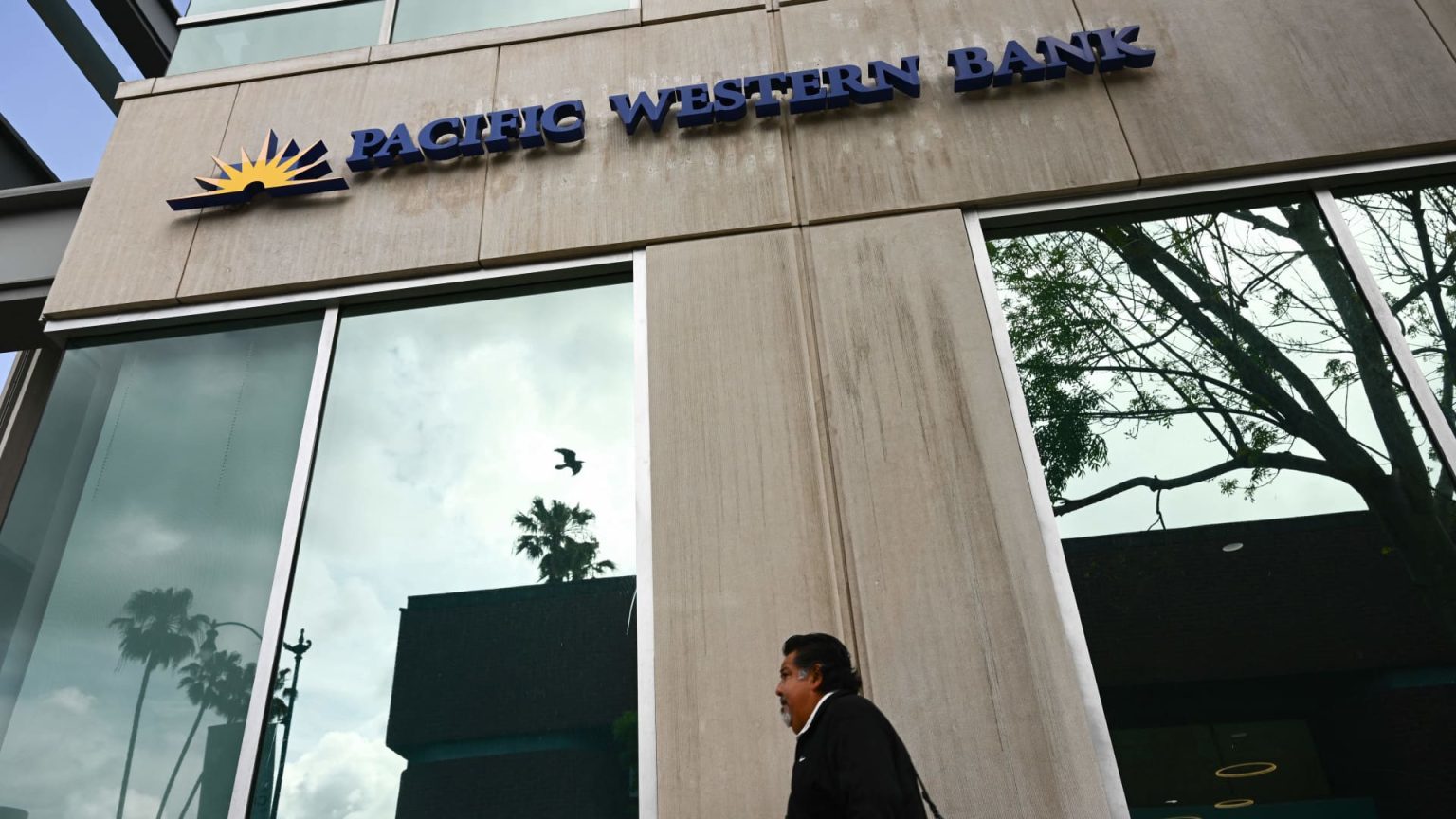A pedestrian walks past a Pacific Western Bank branch in Beverly Hills, California on May 4, 2023.
Patrick T. Fallon | Afp | Getty Images
This report is from today’s CNBC Daily Open, our new, international markets newsletter. CNBC Daily Open brings investors up to speed on everything they need to know, no matter where they are. Like what you see? You can subscribe here.
Upbeat economic data couldn’t overcome the resistance stocks faced from disappointing corporate performance and persistent banking fears.
What you need to know today
- PacWest shares sank 22.7% after the bank said in a securities filing Thursday that its deposits dropped 9.5% last week, following media reports that the regional bank was “evaluat[ing] all options.” Seeking to head off contagion fears, Western Alliance said its deposits have increased by $600 million since May 2. Western Alliance shares fell 0.77%.
- Elon Musk said he is stepping down as Twitter CEO and will oversee product and software. Twitter will get a new CEO, an unnamed woman, in six weeks. Tesla (not Twitter!) shares jumped 2.1% on the news, suggesting investors of Musk’s other company were pleased — or just relieved.
- U.S. stocks traded mixed Thursday as markets were rocked by losses in Disney shares and pressure around regional banks. Asia-Pacific markets were mostly lower Friday. Taiwan’s TWII Index was unchanged even as Foxconn saw its first-quarter net profit slump 56% to 12.83 billion Taiwanese dollars ($417.2 million). Shares of the company, also known as Hon Hai Precision Industry, dropped 2.4%
- The debt ceiling meeting between President Joe Biden and other leaders, scheduled Friday, has been postponed until next week, CNBC learned. But that’s a good thing because it allows lawmakers’ staffs, who are holding their own conversations, to make more progress before the big names are back in the same room, a source told NBC News.
- PRO This chipmaker could hit more than $1 billion in revenue if things go well, according to Morgan Stanley. “Higher price points plus supply chain commentary is pointing to an opportunity that is multiples of our initial target,” wrote analyst Joseph Moore in a note to clients.
The bottom line
Upbeat economic data couldn’t overcome the resistance stocks faced from disappointing corporate performance and persistent banking fears.
First, the promising news (at least when it comes to inflation). April’s wholesale prices in the U.S. rose 0.2% for the month, less than the Dow Jones estimate of 0.3%. That translates to a 2.3% year-over-year increase, down from March’s 2.7% and the lowest since January 2021. In another sign inflation might be coming under control, initial jobless claims increased by 22,000 to 264,000 for the week ended May 6, according to the Department of Labor. That’s the highest reading since Oct. 30, 2021.
But that news didn’t shield markets from other fears. “Investor focus is now on both the economic backdrop and liquidity and what’s going on versus rates and inflation,” said Dylan Kremer, co-chief investment officer of Certuity.
And liquidity — or, in other words, the health of banks and their willingness or ability to make loans — was in focus again Thursday. PacWest shares tumbled, along with other regional banks like Zions Bancorp, which lost 4.5%, and KeyCorp, which fell 2.5%. The SPDR S&P Regional Banking ETF slid 2.5% Thursday.
Another big loser on Thursday was Disney, which sank 8.7% after the media giant reported it had lost subscribers from its Disney+ streaming service. That’s the largest one-day fall, in percentage terms, since Nov. 9, when the company slumped 13%.
Disney’s shares dragged down both the S&P 500, which declined 0.17%, and the Dow Jones Industrial Average, which slid 0.66%. However, the Nasdaq Composite managed to add 0.18%. The tech-heavy index was boosted by a 4.3% jump in Alphabet shares, which are trading at their highest level since August, thanks to investors’ optimism around the artificial intelligence products the tech giant announced at its annual developers conference.
After a heavy week of economic data releases, investor focus will turn to the looming debt ceiling in the U.S. Unease over a potential sovereign default has already spread through markets. For instance, yields for short-term T-bills have jumped sharply this month. Still, most economists and bankers — including JPMorgan Chase CEO Jamie Dimon — expect the U.S. to avoid defaulting. If they’re proven wrong, the results could, in Dimon’s words, be “potentially catastrophic.”
Subscribe here to get this report sent directly to your inbox each morning before markets open.
Read the full article here




